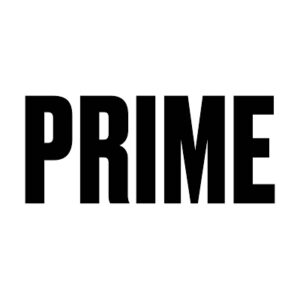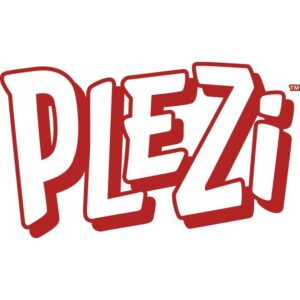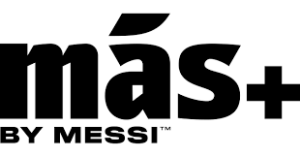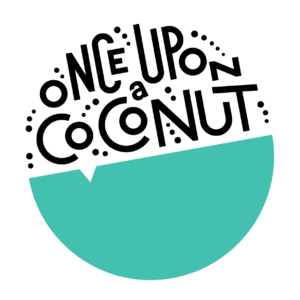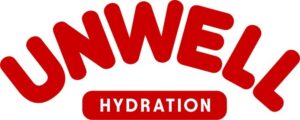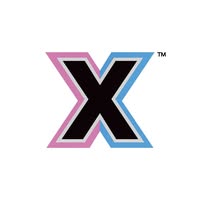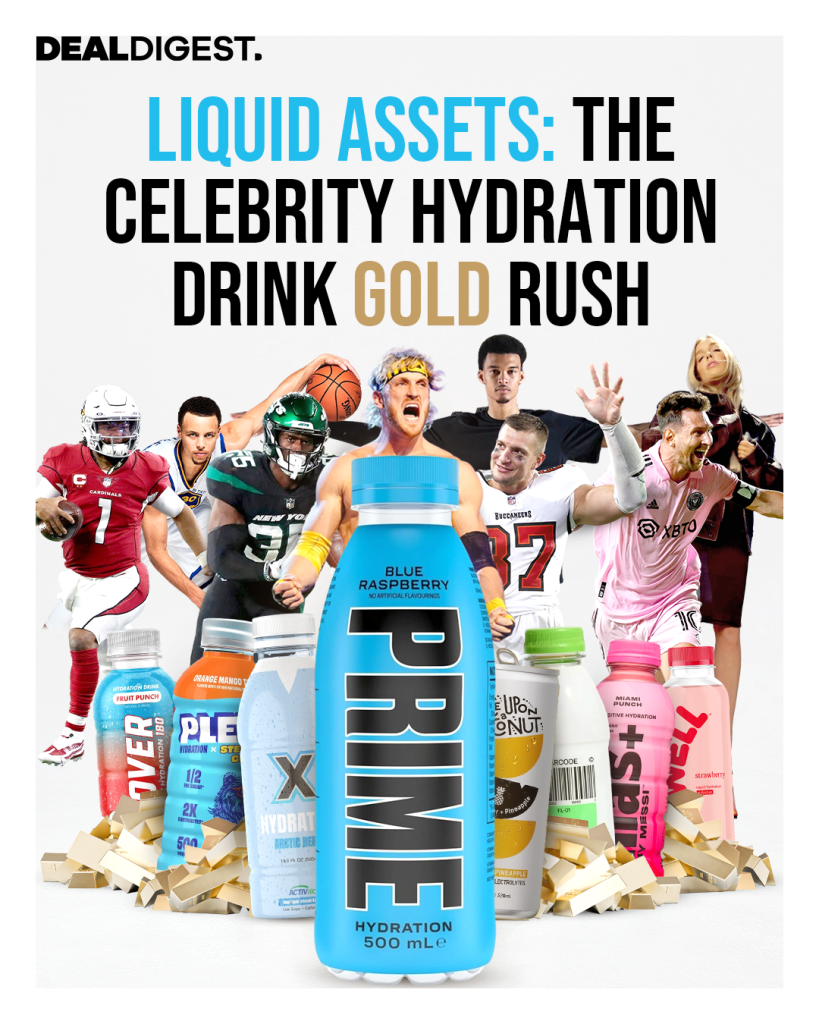
Water is the new tequila — and everyone from Logan Paul to Michelle Obama is trying to own your thirst.
Hydration used to be a functional category. PepsiCo built it with Gatorade. Coca-Cola responded with Powerade, then doubled down by acquiring BodyArmor for $8 billion. Unilever shelled out a reported $600 million for Liquid I.V. — a packet-based upstart with celebrity investors ranging from Kendall Jenner to Kevin Hart. It was a game of distribution, science, and shelf space.
Then Logan Paul entered the chat.
Prime turned a category defined by sodium and potassium into a flex. It wasn’t about electrolytes — it was about attention. Scarcity, neon colors, and influencer muscle turned Prime into a $1B brand overnight. The product didn’t matter. The followers did.
Now? Everyone wants in. Michelle Obama. Lionel Messi. Steph Curry. Victor Wembanyama. Alex Cooper. Gunna. Gronk. They’re not endorsing. They’re equity-holding, cap-table-splitting brand founders. This isn’t a hydration market. It’s a celebrity SPAC in a bottle.
The sports drink aisle is now a proxy war for fame, fandom, and cultural power. Distribution is table stakes. What matters is the size of your audience — and how thirsty they are to buy what you drink.
The Empire They’re Challenging
Legacy Drinks Were Built on Sweat and Science. This Is Something Else.
Before hydration was a celebrity hustle, it was a science-backed business dominated by three players: Gatorade, Powerade, and BodyArmor.
Gatorade, born in a University of Florida lab in 1965, became the default fuel for American sports. It’s owned by PepsiCo and still dominates the category with an estimated 72% market share in U.S. sports drinks as of 2023. Its rise was powered by athlete endorsements from Michael Jordan, Serena Williams, Peyton Manning, Dwyane Wade, and Usain Bolt — not influencers, but icons.
Powerade, Coca-Cola’s answer to Gatorade, never topped the throne, but carved out its niche with massive distribution and partnerships, including the Olympics, NASCAR, and the NCAA.
Then came BodyArmor, founded in 2011 as a better-for-you alternative with a cleaner label and athlete equity model. Early investors included Kobe Bryant, who turned a $6 million stake into $400 million when Coca-Cola acquired full ownership in 2021. BodyArmor leaned heavily on athlete co-owners and endorsers like James Harden, Mike Trout, Naomi Osaka, and Trae Young to differentiate itself.
Together, these three brands built hydration on a formula that worked for decades: Science + Star Athlete + National Distribution = Category Domination
Then the playbook changed. When Prime launched in 2022, it skipped the science and leaned hard into cultural hype. It wasn’t built for athletes — it was built for YouTube thumbnails and TikTok edits. But as the brand exploded, Prime started rewriting its own rules, too. By 2023, it had locked in high-profile athletes like Patrick Mahomes, Kevin Durant, Erling Haaland, and Israel Adesanya, turning its hype into legitimacy — and flexing its ability to win both attention and access.
And that shift cracked open the category.
Legacy brands are now in unfamiliar territory: scientifically superior — and culturally sidelined. Their marketing was built for highlight reels. But the new hydration game is being played on Instagram Stories, in YouTube thumbnails, and through creator cap tables.
In short: the shelf is still theirs. But the culture isn’t.

Prime: The Catalyst
From Internet Flex to Market Force
Prime didn’t just enter the hydration category — it kicked the door off its hinges.
Launched in 2022 by Logan Paul and KSI, Prime turned a basic electrolyte formula into a cultural phenomenon. It wasn’t formulated in a lab. It was engineered for virality. Flavors like “Meta Moon” and “Ice Pop” flew off shelves. Teenagers scalped bottles for £100 online. UK schools banned it. It was hydration as hype cycle — and it worked. Prime hit an estimated $1.2 billion in sales within its first year.
But the flip side of virality is volatility. In 2024, UK sales dropped nearly 50%, making Prime the fastest-declining FMCG product of the year. What was once an exclusive flex became a clearance-rack regular — bottles reportedly marked down to 31p in some stores.
Meanwhile, scrutiny mounted. Prime Energy — the caffeinated sibling — drew backlash for its 200mg of caffeine, prompting concern from regulators, schools, and even U.S. senators. Some countries banned the product outright.
And then came the lawsuits.
Prime sued MÁS+, Lionel Messi’s brand, over its use of a “+” symbol and a bottle design Prime claimed looked a little too familiar. Then it found itself on the receiving end: X Hydration, a small Minnesota-based startup, filed a federal trademark lawsuit alleging Prime’s “X” line was a direct infringement.
When asked about the lawsuit, X Hydration declined to comment. But the message is clear: Prime isn’t just disrupting the category — it’s drawing fire from all sides.
Still, the brand remains a market leader in attention. It built a hydration empire not on ingredients or sports credibility, but on cultural influence — and forced an entire industry to follow.
And it didn’t do it alone. Prime’s ambassador roster reads like a front row at the ESPYs: Kevin Durant, Patrick Mahomes, Erling Haaland, Tyreek Hill, Devin Haney, Israel Adesanya, Alisha Lehmann, and Shakur Stevenson. Add in iShowSpeed, Peso Pluma, Nick Nayersina, and you’ve got a cross-section of Gen Z’s algorithm.
Prime isn’t a sports drink — it’s a content engine with electrolytes.

Once Upon A Coconut: Sweat Equity In A Bottle
No stunt flavors. No UFC deals. Just coconut water, canned credibility, and cold distribution math.
Most hydration startups enter the market with an Instagram strategy and a cap table full of actors who haven’t read their operating agreement. Once Upon A Coconut did the opposite.
Founder John Chiorando launched the company out of spite — literally. He tried investing in a coconut brand, found the books cooked, walked away, and launched his own the next day. No VC. No TikTok teaser. Just a grudge and a product.
The playbook? Taste first, shelf second, hype third.
The result? A brand now sold in Whole Foods, Sprouts, and seven MLB clubhouses. Shareholders include Gronk, Daymond John, and Jazz Chisholm — not because an agency shopped them a deck, but because they DM’d the brand directly.
“We didn’t chase celebrities. They chased us,” Chiorando told DealDigest.
Translation: no agencies, no endorsement deals, no performative partnerships. Just inbound interest, social posts, and signed checks. Gronk joined through a WWE contact. Daymond John cold-DM’d them. Jazz discovered it at a golf charity event. In most cases, the athlete was the lead generator — not their manager.
The brand has positioned itself as the anti-Prime: low noise, high taste, clean ingredients, and aluminum packaging that appeals to moms, athletes, and eco-conscious shoppers. While Prime dominates shelf space in Walmart, Coconut is quietly winning in stores that actually measure repeat purchase behavior.
“Shelf space is real estate,” Chiorando said. “And we’re getting upgraded to refrigerated space. That’s beachfront property.”
They also just took money from a major talent agency — terms undisclosed, announcement pending. That’s not a PR stunt. It’s vertical integration.
Once Upon A Coconut is what happens when a founder skips the hype cycle, bets on taste, and lets culture catch up to the brand — not the other way around.

X Hydration: The Anti-Hype Brand That Took Prime to Court
Aloe-based. Athlete-backed. And bold enough to sue the category’s loudest player.
In a hydration category increasingly shaped by celebrity equity and cleaner branding, X Hydration is carving out a niche rooted in wellness — not virality. Aloe-based. Athlete-promoted. And focused less on hype than on habit.
Founded in Minnesota by Brian Boakye-Ansah, the brand skipped the circus and went straight to credibility. No stunt flavors. No internet theatrics. Just a wellness-forward product built for the kind of consumer who reads ingredients — and trains for something other than clout.
Its ambassador roster includes NFL quarterback Josh Dobbs, NBA guard Wendell Moore Jr., and Vikings wide receiver Jalen Nailor — not just to post, but to participate. X Hydration partners with LIFT Sports Management, which sees hydration not as a sponsorship opportunity, but a natural extension of an athlete’s identity.
And the positioning isn’t accidental. According to Layden Williams, Director of Athlete Marketing at LIFT, athletes today aren’t interested in one-off deals — they want upside.
“Athletes prefer equity over one-off deals so they can grow with the brand,” he tells DealDigest. “It’s a natural fit for us — we manage athletes, and hydration is a natural extension of their identity.”
The agency structured deals to give talent a deeper stake — creative input, storytelling, and long-term value. It’s not a volume play. It’s a belief that building brand equity alongside athletic equity leads to stickier, more meaningful partnerships.
“X Hydration is looking to become a household name,” Boakye-Ansah said. “We’re not interested in short-term plays. We’re building something sustainable.”
Then came the lawsuit — but not the way you’d expect. In 2023, X Hydration filed a federal trademark claim against Prime, alleging that Prime’s “X” line was confusingly similar and infringing on their name. Prime and X Hydration declined to comment.
Whether coincidence or signal, the moment marked a shift: a small, wellness-forward brand suddenly found itself in the legal crosshairs of the category’s loudest player. The bet? That ownership outperforms hype. And that aloe — not AdSense — is the future of functional drinks.

Barcode: The Biohacker’s Sports Drink
Adaptogens, Wemby, and the Erewhon-to-NBA pipeline.
Barcode didn’t come from a focus group. It came from a gym bag.
Co-founded by trainer Mubarak “Bar” Malik and NBA forward Kyle Kuzma, Barcode started as a homemade wellness brew handed out in the Lakers locker room during a championship run. Then it became a company.
The formula? 30 calories. 0g added sugar. Magnesium, vitamin D, ashwagandha — hydration for people who know what a WHOOP score is.
This isn’t your dad’s Gatorade. This is biohacker juice in a bottle — and the marketing strategy reflects it. Barcode didn’t hire influencers. It drafted one: Victor Wembanyama, the 7’4″ French phenom who signed a five-year deal before playing a single NBA game. He also invested.
Then Barcode became the official sports drink of the Brooklyn Nets and landed on the shelves at Erewhon, LA’s elite organic grocer. The crossover was complete. Functional hydration went full startup.
Barcode is the brand you sip when you’re tracking macros, watching NBA League Pass, and still thinking about Huberman’s last podcast. It speaks performance fluency — in the gym, in the league, and in the group chat.
Where Prime sells hype and Once Upon A Coconut sells taste, Barcode sells optimization. It’s betting that hydration isn’t a lifestyle. It’s an upgrade.
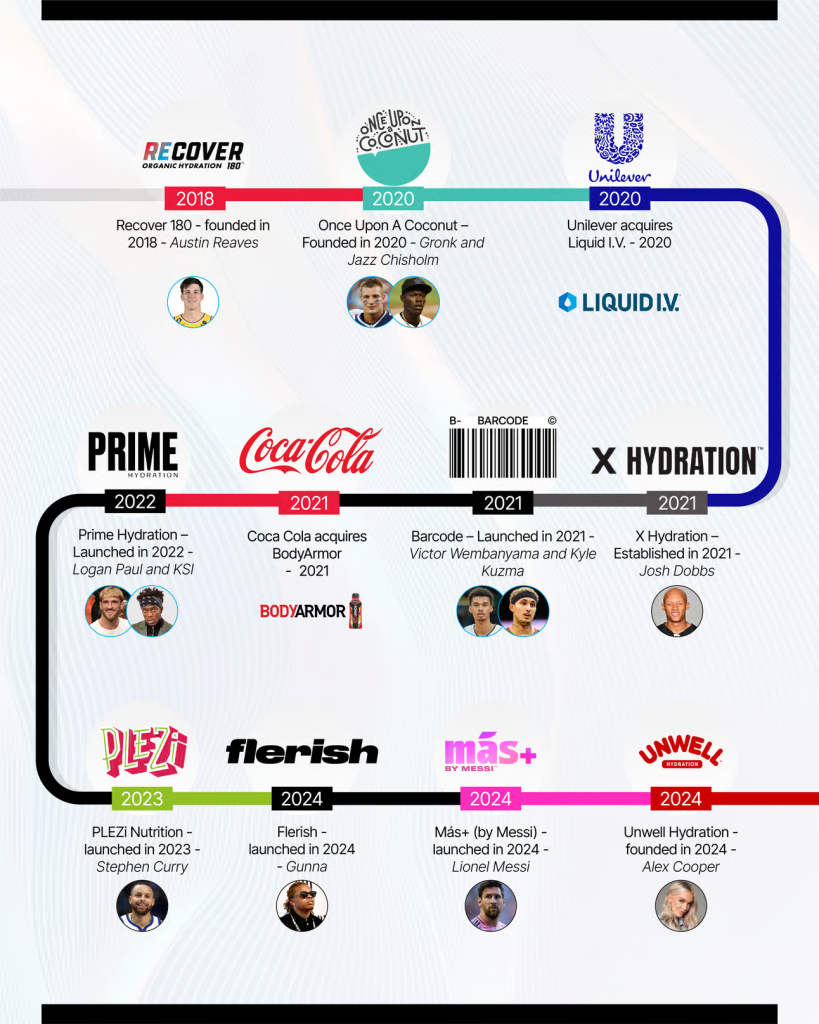

PLEZi: Hydration with Homework
Michelle Obama, Steph Curry, and the cleanest hydration play in the aisle.
Most celebrity-backed hydration brands go loud. PLEZi went policy wonk.
Co-founded by Michelle Obama, PLEZi isn’t trying to be cool. It’s trying to be correct. Built in a test kitchen of school reform and public health, it launched with the energy of a well-funded PTA and the branding budget of a legacy nonprofit. The drink isn’t trying to beat Prime. It’s trying to beat childhood obesity.
In 2024, the brand brought in Steph Curry to co-found a hydration line. The pitch? Less sugar, more electrolytes, and a brand voice that sounds like it got cleared by a team of pediatricians. The target demo isn’t kids — it’s the gatekeepers: parents, principals, policymakers.
Gatorade convinced coaches. Prime convinced 13-year-olds. PLEZi is targeting the fridge — one grocery decision at a time.
The branding is clean. The rollout was national. And the marketing sounds like it came from a federal grant proposal. Which is probably the point.
PLEZi isn’t building a brand. It’s trying to build a movement — one that happens to come in 12-ounce bottles.
It’s a safe bet in a chaotic market. But in a category driven by hype, personality, and Instagram thirst traps, that safety might also be the ceiling.
Because in 2025, winning hearts may matter more than winning Whole Foods.

Flerish: Gunna’s Rebrand Comes in a Bottle
Clean living. Functional hydration. Celebrity ownership as narrative arc.
Gunna didn’t just change his lifestyle — he bottled it.
The rapper is now co-owner of Flerish, a watermelon-based hydration brand with clean ingredients, no dyes, and enough functional buzzwords (L-Theanine, magnesium, B-vitamins) to make Erewhon blush.
It’s not a cash grab. It’s a vibe shift.
Gunna’s transformation — from club icon to discipline influencer — is now asset-backed. “There’s no off switch,” he said. “I needed something that supports me naturally.” Flerish is that support system, and also a cap-table entry.
Founded in 2024 by former D1 athlete Avery Johnson Jr., Flerish has already shown up at Coachella, the Super Bowl, NBA All-Star, and the Final Four — skipping retail and going straight to culture.
It’s not hydration. It’s brand rehabilitation with vitamins.
And with 32 million monthly Spotify listeners and a global fanbase, Gunna isn’t just the face. He’s the distribution strategy.

MÁS+: Messi’s Victory Lap in a Bottle
The GOAT launches a hydration brand. Prime files a lawsuit. Welcome to 2025.
At this point, launching a hydration drink is just part of the post-fame asset management plan. Messi won a World Cup. Then he launched MÁS+ — a sports drink built for mass retail and highlight reels.
Partnered with the makers of White Claw, MÁS+ launched at scale. Bold bottle. Formula fine-tuned for Instagram shelfies. Flavor names pulled from Messi’s Wikipedia page (Limón Lime League, Orange d’Or). It reads like a marketing thesis with electrolytes.
The brand isn’t shy about what it is: celebrity IP as consumer packaged good. No startup hustle, no slow rollout. Just global reach, professional polish, and a shortcut to distribution through Mark Anthony Brands.
MÁS+ isn’t built to be cool. It’s built to be everywhere.
It also immediately triggered legal drama: Prime sued over the plus sign and packaging. Because in a space where logos and hype sell more than ingredients, the trademark matters more than the formula.
Messi didn’t respond. He didn’t need to. This isn’t a side hustle. It’s a scaled platform play backed by beverage infrastructure — not YouTube subscribers.
But whether MÁS+ wins will come down to a brutal metric: does global fame still move product when the shelf is crowded with the same strategy?

Recover 180: Built Different
Credibility over clout. Clean over chaos.
Unlike its louder competitors, Recover 180 didn’t launch with neon hype and YouTuber theatrics. It took a different route: less sugar, fewer gimmicks, more credibility. No flash mobs. Just Brock Purdy and Jason Aldean on the same shelf.
The brand is helmed by beverage veteran Lance Collins — the guy behind BodyArmor, Fuze, and NOS. And it’s being boosted by a deep bench of athlete ambassadors: James Harden, Austin Reaves, Jared McCain, Buddy Hield, Wyndham Clark, Kyler Murray, and DeMarvion Overshown, among others. Add in Jason Aldean for the country crowd, and Recover 180’s cultural footprint is growing in multiple directions.
Helping lead the music push is Mike G, a UTA music agent and strategic investor, who sees Recover 180 as more than a locker room essential. He sees a lifestyle brand for high-performance artists and entertainers. “I see myself helping amplify Recover 180’s visibility by bringing it into the world of music, entertainment, and cultural moments that matter,” he told DealDigest. He’s already brought Jason Aldean into the fold — a crossover that included tour integration and a fan promo with Luke Bryan.
What makes the drink stick? Ingredients. “Athletes and artists are more conscious than ever about what they put into their bodies,” Mike G said. “Recover 180 meets that standard.”
So far, the push is working. The brand is gaining ground with consumers looking for a recovery drink that feels more Whole Foods than WrestleMania. And with new music deals in the works, Recover 180 is aiming to become the default hydration choice for both hype reels and hotel riders.

Unwell: Hydration for the Hangover Economy
Alex Cooper turned therapy into a podcast — and now a sports drink.
Unwell isn’t selling hydration. It’s selling chaos — branded, bottled, and ready for retail.
Launched by Alex Cooper, host of the wildly successful Call Her Daddy podcast, Unwell is hydration for the chronically online, emotionally unstable, aesthetically curated generation that drinks Celsius by day and espresso martinis by night.
The strategy? Embrace the chaos. The name is the brand. “Unwell” isn’t a warning — it’s a lifestyle. The hydration equivalent of a chaotic TikTok trend wrapped in pastel packaging.
Backed by Nestlé, Unwell skipped indie startup status and went straight to a Target exclusive, followed by Amazon and national retail. The drink has vitamins, electrolytes, and just enough wellness to get by without actually threatening to fix anything.
It’s not Gatorade. It’s vibe-a-rate.
Cooper’s pitch is clear: this isn’t athlete hydration. It’s influencer recovery — post-club, post-breakdown, pre-brunch. The product is functionally fine. The marketing is meme-ready. And the entire launch was built like a DTC drop: scarcity, attitude, and a bottle that belongs in a “what’s in my bag” TikTok.
Unwell is the first hydration brand designed to be chugged after a spiral — and that might be its smartest angle. Because in a market where athletes, moms, and biohackers already have their drink, Unwell went after the group chat.
The Shelf Is the New Exit Strategy
In 2025, hydration isn’t a product. It’s a portfolio play.
Attention is the currency. Distribution is the moat. And hydration is the new exit strategy.
Celebrities used to endorse drinks. Now they launch them — not because they love electrolytes, but because CPG is the fastest way to turn relevance into revenue.
Prime is a marketing engine in a bottle. PLEZi is a White House initiative with a nutrition label. Coconut is revenge hydration. Barcode is wellness-bro fuel dressed as a science experiment. MÁS+ is a global licensing deal disguised as lime water. And Unwell is recovery juice for the hungover, oversharing internet class.
None of them are really selling hydration. They’re selling narratives — with equity upside.
This isn’t a beverage trend. It’s the SPAC-ification of sports drinks.
Not everyone has figured out how to convert brand equity into repeat purchase behavior — even though everyone wants shelf space and cultural capital. But the brand that wins won’t just be the loudest or cleanest or most professionally packaged. It’ll be the one that gets someone to buy it twice.
Because in this market, the bottle is branding, the shelf is strategy, and liquidity has never meant more things at once.


